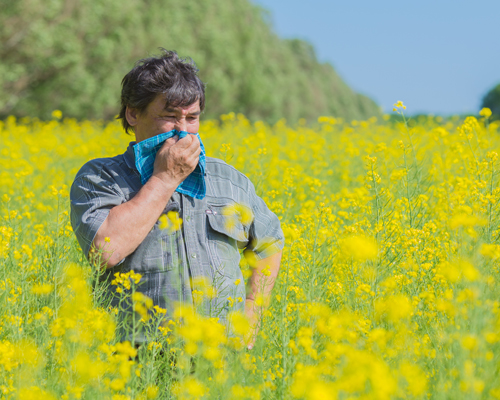Mr Jonathan Joseph, Consultant ENT, Head and Neck and Facial Plastic Surgeon, tells us more about allergic rhinitis and how to treat it.

What are the symptoms?
The symptoms of hay fever (allergy) can have a major impact on daily life. Nasal blockage can impair your ability to exercise and disrupt sleep, causing daytime tiredness and an inability to function to your full potential.
Watery nasal discharge can be socially embarrassing, irritate the skin above the upper lip, cause a sore throat and lead to a hoarse voice.
There can be other more general allergic symptoms such as itchy and watery eyes, chest tightness and exacerbation of asthma and itchy skin.
It is imperative to manage these symptoms as effectively as possible, particularly around this time of year, when the pollen count is high.
How is hay fever diagnosed?
A simple skin prick test is a reliable method for determining exactly what you are allergic to. In a few cases we will do blood tests to find the allergy.
Following a positive test, advice can be given on how to avoid the allergen. Examples include the use of pollen air filters for hay fever, or by removing carpets and curtains for dust allergy.
What treatments are available?
The first stage of treatment is to use anti-histamine medication which can be either taken by mouth, or as a nasal spray. Combining this with a nasal saline rinse is effective. The rinse cleans the nose, flushing out any irritants such as pollen or dust particles. Oral anti-histamines are particularly relevant in the presence of more generalised allergic symptoms, such as itchy skin.
The next step would be to use a nasal steroid spray as an anti-inflammatory medication.
There has been a game changer in this field with the introduction of Dymista. This combines an effective steroid and anti-histamine in one single spray. Studies have shown that this combination spray is even more effective than taking separate steroid and anti-histamine sprays.
Occasionally, we will use steroid tablets to provide fast effective relief in difficult cases but these must be used with caution, due to potentially significant side effects.
For those patients who do not respond well to these medications there is the option of immunotherapy. It aims to de-sensitise you to the allergen and effectively ‘cure’ the allergy.
In a few difficult cases, surgery can be effective to reduce nasal blockage by removing some of the most swollen parts of the nose, in a procedure known as a turbinoplasty.
There are many treatment options for allergic rhinitis so sufferers must be made aware that their symptoms can be improved. A stepwise approach is usually the best way forward, starting with ensuring a correct diagnosis, reducing exposure to the allergen and taking medication when appropriate.
Find out more about allergy treatments
Book an appointment with Mr Jonathan Joseph





